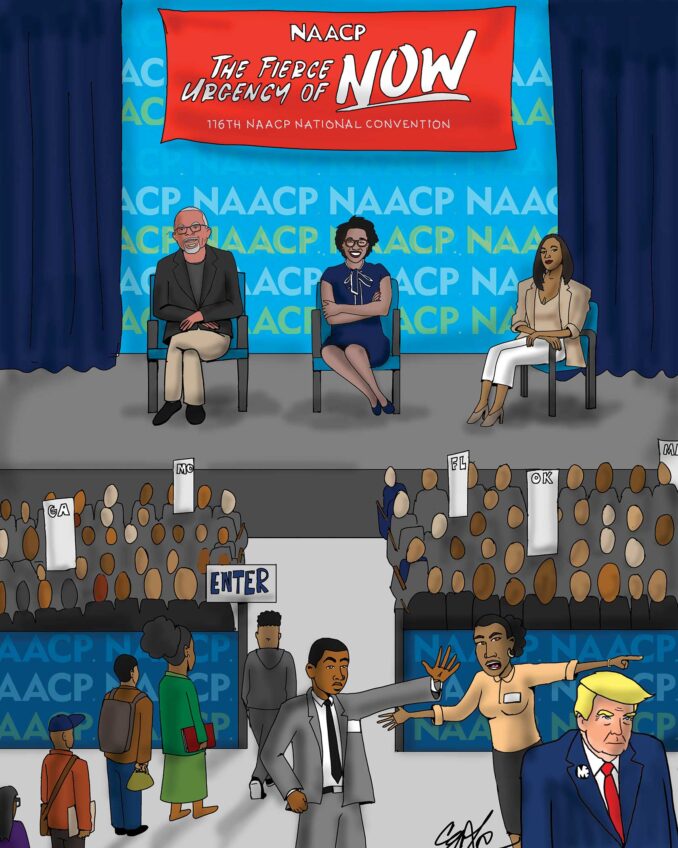The War on Poverty
Excerpts from President Lyndon Johnson’s
Jan. 8, 1964 State of the Union address
With the growth of our country has come opportunity for our people — opportunity to educate our children, to use our energies in productive work, to increase our leisure — opportunity for almost every American to hope that through work and talent he could create a better life for himself and his family.
The path forward has not been an easy one. But we have never lost sight of our goal: an America in which every citizen shares all the opportunities of his society, in which every man has a chance to advance his welfare to the limit of his capacities.
We have come a long way toward this goal. We still have a long way to go. The distance which remains is the measure of the great unfinished work of our society.
To finish that work I have called for a national war on poverty. Our objective: total victory.
There are millions of Americans — one-fifth of our people — who have not shared in the abundance which has been granted to most of us, and on whom the gates of opportunity have been closed. What does this poverty mean to those who endure it? It means a daily struggle to secure the necessities for even a meager existence. It means that the abundance, the comforts, the opportunities they see all around them are beyond their grasp.
Worst of all, it means hopelessness for the young. The young man or woman who grows up without a decent education, in a broken home, in a hostile and squalid environment, in ill health or in the face of racial injustice — that young man or woman is often trapped in a life of poverty. He does not have the skills demanded by a complex society. He does not know how to acquire those skills. He faces a mounting sense of despair which drains initiative and ambition and energy.
The war on poverty is not a struggle simply to support people, to make them dependent on the generosity of others. It is a struggle to give people a chance. It is an effort to allow them to develop and use their capacities, as we have been allowed to develop and use ours, so that they can share, as others share, in the promise of this nation.
We do this, first of all, because it is right that we should. From the establishment of public education and land grant colleges through agricultural extension and encouragement to industry, we have pursued the goal of a nation with full and increasing opportunities for all its citizens. The war on poverty is a further step in that pursuit.
We do it also because helping some will increase the prosperity of all. Our fight against poverty will be an investment in the most valuable of our resources — the skills and strength of our people. And in the future, as in the past, this investment will return its cost many fold to our entire economy.
If we can raise the annual earnings of 10 million among the poor by only $1,000 we will have added 14 billion dollars a year to our national output. In addition we can make important reductions in public assistance payments which now cost us 4 billion dollars a year, and in the large costs of fighting crime and delinquency, disease and hunger.
This is only part of the story.
Our history has proved that each time we broaden the base of abundance, giving more people the chance to produce and consume, we create new industry, higher production, increased earnings and better income for all. Giving new opportunity to those who have little will enrich the lives of all the rest.
Because it is right, because it is wise, and because, for the first time in our history, it is possible to conquer poverty, I submit, for the consideration of the Congress and the country, the Economic Opportunity Act of 1964.
The Act does not merely expand old programs or improve what is already being done. It charts a new course. It strikes at the causes, not just the consequences of poverty. It can be a milestone in our one-hundred eighty year search for a better life for our people. …
What you are being asked to consider is not a simple or an easy program. But poverty is not a simple or an easy enemy. It cannot be driven from the land by a single attack on a single front. Were this so we would have conquered poverty long ago.
If we now move forward against this enemy — if we can bring to the challenges of peace the same determination and strength which has brought us victory in war — then this day and this Congress will have won a secure and honorable place in the history of the nation, and the enduring gratitude of generations of Americans yet to come.
Lyndon B. Johnson






